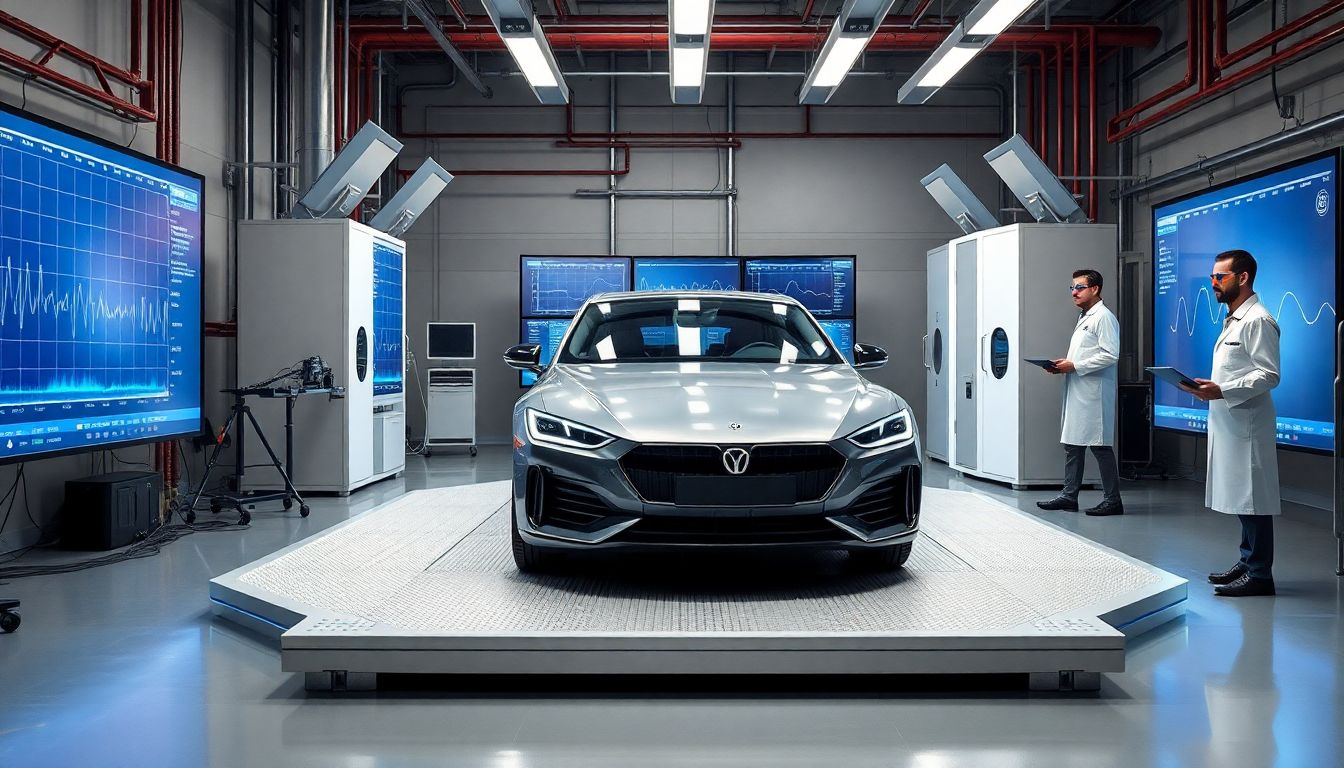
Automotive EMC Testing: Ensuring Reliability and Safety in Modern Vehicles
Electromagnetic compatibility (EMC) is more important than ever in today’s cars. As vehicles pack more electronics and sensors, they become more vulnerable to electrical interference. A single electromagnetic problem can cause system failures, safety issues, or even vehicle fires. That’s why rigorous automotive EMC testing is crucial. It helps manufacturers meet strict rules, keeps consumers safe, and protects the brand reputation.
Understanding Automotive EMC Testing
What is Electromagnetic Compatibility (EMC)?
EMC means a vehicle’s electronic parts work well without causing or being affected by electromagnetic interference (EMI). EMI is any outside electrical noise that can disrupt the vehicle’s systems. Electromagnetic susceptibility (EMS) is a vehicle’s ability to resist this noise. Both are essential to ensure a vehicle operates smoothly in different environments.
Why Automotive EMC Testing Matters
Electromagnetic disturbances can cause malfunctions. For example, it might turn off critical safety features or mess with navigation systems. If a car fails an EMC test, it risks recalls, fines, or damage to reputation. Proper testing helps find issues early, avoiding costly mistakes.
Regulatory Landscape and Industry Standards
Several rules govern automotive EMC. Standards like ISO 11452, CISPR 25, and ISO 7637 specify testing methods. Globally, regulations like UNECE Regulation 10 and SAE standards set the bar. Not complying with these rules can lead to recalls and legal problems, which hurt car makers and consumers alike.
Streamline your global market entry — let H.B. Compliance Solutions help you achieve FCC, ISED, and CE Mark product approvals with expert guidance and testing support.
Types of Automotive EMC Testing
Radiated Susceptibility Testing
This test checks if a vehicle’s systems can withstand external electromagnetic fields. It’s like exposing the car to a strong radio signal to see if anything breaks. Tests happen in special chambers that simulate real-world electromagnetic waves.
Conducted Susceptibility Testing
Here, attention shifts to interference traveling through wiring. Power lines and data cables are tested to see if external signals can disturb the vehicle’s electronics. Techniques involve injecting signals into wiring harnesses and observing responses.
Radiated Emissions Testing
This measures how much electromagnetic energy a vehicle emits naturally. Too much emission can interfere with nearby devices. Testing helps ensure vehicles stay within legal limits and won’t cause problems outdoors.
Conducted Emissions Testing
This test looks at electromagnetic noise escaping through power and signal lines. Excessive noise can disturb other electronics, like radios or cell phones. Compliance with standards prevents future interference issues.
Transient Immunity Testing
Automobiles face sudden power surges, like load dumps or switching transients. This test mimics those events to see if the vehicle’s systems can handle them. It guarantees robustness against real-world conditions.
Automotive EMC Testing Procedures and Equipment
EMC Test Chamber Types
Testing often takes place in anechoic chambers that block external signals or open-area test sites with controlled setups. These chambers are chosen based on vehicle size, test type, and required precision.
Test Equipment and Instruments
Professionals use spectrum analyzers to measure signals, signal generators to mimic interference, and transient generators to simulate power surges. Simulation software can predict issues before actual testing, saving time.
Testing Protocols and Methodologies
Standards dictate step-by-step procedures. Tests involve setting up the vehicle, running specific electromagnetic scenarios, and recording data. Well-documented results ensure compliance and reveal needed improvements.
Best Practices for Testing
Calibration of instruments is key for accurate results. Always control the testing environment for consistency. Prepare vehicles in advance, ensuring wiring and systems are accessible. Avoid common mistakes like improper grounding or unshielded wiring.
Challenges and Advancements in Automotive EMC Testing
Technological Challenges
Miniature electronics and complex wiring add new hurdles. Electric and hybrid vehicles face unique challenges due to high-voltage systems and dense electronic packs.
Testing Complex Modern Vehicles
Autonomous and connected cars rely on many wireless links. Testing must include vehicle-to-vehicle (V2V), vehicle-to-infrastructure (V2I), and IoT connections. Ensuring these work without interference is key.
Innovations and Future Trends
New techniques like over-the-air testing are emerging. 5G, V2X, and stricter emission standards push for advanced testing methods. Using simulation tools helps cut costs and speed up testing processes.
Expert Insights and Industry Case Studies
Leading labs and standards organizations emphasize early testing and thorough documentation. For instance, some manufacturers faced recalls due to EMI issues that could have been caught earlier. Sharing these stories helps us learn and improve.
Actionable Tips for Automotive Manufacturers
- Start testing early in the design phase.
- Use quality test equipment and certified labs.
- Partner with EMC experts to understand results.
- Keep pace with new standards and threats.
- Document all tests to streamline compliance processes.
Conclusion
Automotive EMC testing is vital to vehicle safety, performance, and legal compliance. Incorporating these tests early saves money and prevents future problems. As cars become more connected and electric, staying ahead with proper testing is a must. The goal is simple: create reliable vehicles that protect drivers and passengers. Continuous innovation and strict adherence to standards ensure we meet these promises, making every journey safer.
Ensure your automotive products meet the highest safety and EMC standards — partner with H.B. COMPLIANCE for expert testing and reliable certification support.
